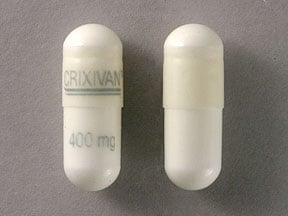
Crixivan Coupons & Savings Card – Discount Prices from $69.94
My prescription
Edit
400MG, Crixivan (30 Capsules)
Select pharmacy

CVS
$102.31
COUPON PRICE
Walmart
$69.94
COUPON PRICE
Walgreens
$80.93
COUPON PRICECrixivan savings card
Show this card to your pharmacist
Walmart
$69.94
BIN
ID
PCN
GRP
019876
LHDF4B76A2
CHIPPO
LHX
Powered by
Related protease inhibitors prescriptions
More prescriptions for hiv treatment
Related protease inhibitors prescriptions
More prescriptions for hiv treatment
Price history for Crixivan
30 Capsules, 400MG
Average retail price for Crixivan
Average SaveHealth price for Crixivan
Our price history data is based on aggregated prescription data collected from participating pharmacies in America. Our prescription data updates daily to reflect the latest price changes. If you notice a missing data point, it means there wasn't sufficient data available to generate a monetary value for that date.
*Retail prices are based on pharmacy claims data, and may not be accurate when we don't have enough claims.
Crixivan dosage forms
Dosage Quantity Price from Per unit 400MG 30 Capsules $69.94 $2.33 400MG 60 Capsules $158.88 $2.65 400MG 90 Capsules $247.81 $2.75
| Dosage | Quantity | Price from | Per unit |
|---|---|---|---|
| 400MG | 30 Capsules | $69.94 | $2.33 |
| 400MG | 60 Capsules | $158.88 | $2.65 |
| 400MG | 90 Capsules | $247.81 | $2.75 |
Crixivan Warnings
When considering the use of Crixivan, it's important to be aware of several significant health risks associated with this medication:
Kidney Stones (Nephrolithiasis/Urolithiasis): Crixivan has been linked to the formation of kidney stones, occurring in approximately 12.4% of adult patients and 29% of pediatric patients. Symptoms may include flank pain, with or without blood in the urine. To reduce this risk, it's recommended that patients maintain adequate hydration by drinking at least 1.5 liters (approximately 48 ounces) of liquids daily. If symptoms of kidney stones develop, temporary interruption or discontinuation of therapy may be considered.
Hemolytic Anemia: There have been reports of acute hemolytic anemia, a condition where red blood cells are destroyed faster than they can be made, in patients taking Crixivan. In some cases, this condition has been severe and even fatal. If hemolytic anemia is diagnosed, discontinuation of Crixivan is advised.
Liver Issues (Hepatitis): Instances of hepatitis, including cases leading to liver failure and death, have been reported among patients on Crixivan. While many of these patients had other medical conditions or were on additional therapies, it's crucial to monitor liver function regularly during treatment.
Blood Sugar Changes (Hyperglycemia): Some patients have experienced new-onset diabetes, worsening of existing diabetes, or increased blood sugar levels while on protease inhibitors like Crixivan. In certain cases, this has led to serious conditions such as diabetic ketoacidosis. Monitoring blood sugar levels is important, and adjustments to diabetes medications may be necessary.
Fat Redistribution: Patients undergoing antiretroviral therapy, including Crixivan, have observed changes in body fat distribution. This can manifest as increased fat in areas like the upper back and neck, breasts, and around the trunk, or as fat loss from the legs, arms, and face. The exact cause and long-term health effects of these changes are not fully understood.
Immune Reconstitution Syndrome: In some cases, patients starting combination antiretroviral therapy have developed inflammatory responses to existing infections, necessitating further evaluation and treatment.
Osteonecrosis: There have been reports of osteonecrosis, a condition where bone tissue dies due to reduced blood flow, particularly in patients with advanced HIV disease or those on long-term combination antiretroviral therapy. Symptoms include joint pain, stiffness, or difficulty moving.
Bleeding in Hemophilia Patients: Increased spontaneous bleeding has been reported in patients with hemophilia A and B who are treated with protease inhibitors like Crixivan. Additional factor VIII may be required in such cases.
Given these potential risks, it's essential for patients to have regular medical check-ups and communicate any unusual symptoms to their healthcare provider promptly.
Crixivan Side Effects
When taking this medication, you may experience mild side effects such as stomach pain, nausea, vomiting, heartburn, loss of appetite, or headache. These are generally not serious, but inform your healthcare provider if they persist or worsen. In some cases, as your immune system strengthens, it may react by fighting infections you previously had, potentially causing symptoms to return or appear anew. Serious side effects require immediate medical attention. These include unexplained weight loss, severe fatigue, persistent muscle aches or weakness, severe headaches, joint pain, numbness or tingling in limbs, vision changes, or signs of infection like fever, swollen lymph nodes, and breathing difficulties. Be alert for signs of an overactive thyroid, such as irritability and irregular heartbeat, or symptoms of Guillain-Barre syndrome, which affects coordination and muscle control. Severe side effects can include persistent nausea or vomiting, chest pain or discomfort suggestive of a heart attack, easy bruising or bleeding, abdominal pain, jaundice, dark urine, and signs of kidney issues like changes in urination. Indinavir may lead to kidney stones, so watch for pain in your side or back, pink or bloody urine, or painful urination. There is a potential for increased blood sugar levels, possibly exacerbating diabetes. Be mindful of symptoms like increased thirst and urination. You might also notice changes in body fat distribution; the long-term effects of this are unclear, so discuss any concerns with your healthcare provider. Though rare, severe allergic reactions can occur, marked by rash, swelling, dizziness, or breathing difficulties. Seek help immediately if these occur. Always report any unusual side effects to your healthcare provider.
Crixivan Interactions
When taking Crixivan (indinavir), it's crucial to be aware of potential interactions with other medications, as these can affect how well Crixivan works or increase the risk of side effects. Crixivan is processed in the body by an enzyme called CYP3A4, and it can also influence the activity of this enzyme. This means that Crixivan can interact with other drugs that are metabolized by CYP3A4, leading to higher or lower levels of these drugs in your bloodstream.
Medications to Avoid with Crixivan:
Some drugs should not be taken with Crixivan because they can cause serious or life-threatening reactions. These include:
Certain Heart Medications: Amiodarone, a medication used to treat irregular heartbeats, can interact dangerously with Crixivan.
Ergot Derivatives: Medications like Dihydroergotamine, ergonovine, ergotamine, and Methylergonovine, used for migraines and other conditions, can lead to severe side effects when combined with Crixivan.
Sedatives: Oral midazolam and Triazolam, which are used to treat anxiety and sleep disorders, should not be taken with Crixivan due to the risk of excessive sedation or respiratory depression.
Cholesterol-Lowering Drugs: Lovastatin and Simvastatin, commonly used to lower cholesterol, can increase the risk of muscle problems, including a serious condition called rhabdomyolysis, when taken with Crixivan.
St. John's Wort: This herbal supplement can significantly reduce the effectiveness of Crixivan by lowering its levels in the blood.
Medications Requiring Caution:
Other medications may require dose adjustments or careful monitoring when taken with Crixivan:
Cholesterol Medications: Atorvastatin and Rosuvastatin levels can increase when taken with Crixivan, raising the risk of muscle-related side effects. It's important to use the lowest effective dose and monitor for any adverse effects.
Erectile Dysfunction Drugs: Sildenafil, Tadalafil, and Vardenafil can have increased levels in the blood when combined with Crixivan, leading to side effects like low blood pressure, visual disturbances, and prolonged erections. Lower doses and careful monitoring are recommended.
Antidepressants: Trazodone levels can rise when taken with Crixivan, potentially causing nausea, dizziness, low blood pressure, and fainting. A lower dose of trazodone may be necessary.
Anti-Gout Medication: Colchicine levels can increase with Crixivan, which may lead to toxicity. Patients with kidney or liver problems should avoid this combination.
Inhaled Steroids: Fluticasone, used for asthma and allergies, can have increased levels when taken with Crixivan, potentially leading to side effects like Cushing's syndrome. Alternative treatments should be considered, especially for long-term use.
General Recommendations:
Always inform your healthcare provider about all medications, supplements, and herbal products you are taking before starting Crixivan. This will help them assess potential interactions and adjust your treatment plan accordingly. Regular monitoring and open communication with your healthcare team are essential to ensure the safe and effective use of Crixivan.
Is Crixivan still available?
Crixivan (indinavir) is no longer available in the United States. The manufacturer, Merck, discontinued its production in 2016. Patients who were taking Crixivan should consult their healthcare provider for alternative treatment options.
What is Crixivan used for?
Crixivan is used as part of antiretroviral therapy for the treatment of HIV infection. It helps to decrease the amount of HIV in the body, thereby improving the immune system function and reducing the risk of developing HIV-related complications.
What class of drug is Crixivan?
Crixivan is classified as a protease inhibitor.
What are the symptoms of indinavir stones?
Indinavir stones, which are kidney stones associated with the use of the antiretroviral drug indinavir, can present with several symptoms. These may include flank pain, hematuria (blood in the urine), nausea, vomiting, and difficulty urinating. In some cases, patients may also experience urinary frequency or urgency. It is important for individuals experiencing these symptoms to seek medical evaluation for proper diagnosis and management.
Is Crixivan still used?
Crixivan, also known as indinavir, is an antiretroviral medication that was used in the treatment of HIV. While it was once a common part of HIV therapy, its use has significantly declined due to the development of newer antiretroviral drugs that have improved efficacy, better side effect profiles, and more convenient dosing schedules. However, it may still be used in certain situations where newer medications are not suitable. It is important for patients to consult with their healthcare provider to determine the most appropriate treatment regimen for their specific condition.
